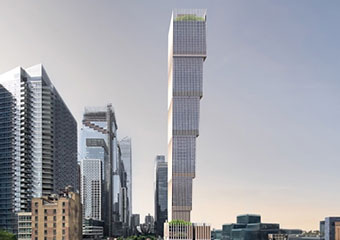By Tanya A. Christian
There are roughly 300 skyscrapers sprawled across the iconic New York City skyline. And to date, not one has been built by a majority Black team. That’s despite New York ranking among the most diverse cities in the country, and having the largest number of people reporting as Black — roughly 3.3 million — according to the latest U.S. Census.
“Think about that,” real estate entrepreneur Don Peebles offers. “All the skyscrapers in the skyline of New York City —all of them — not one has been built by a Black developer, not one has been constructed by a Black contractor, or a construction company, and only one had any element of design by a Black architect, and that's fairly recent.”
Peebles is part of a collaborative of savvy developers working to disrupt the city’s status quo by erecting the first skyscraper built by a majority Black team. And they plan to call it Affirmation Tower. The project, according to Peebles and partner in the initiative, Craig Livingston, would serve as a towering example of Black excellency.
“This is an opportunity to really create a paradigm shift and to start to build a Black economy that Black companies actually participate in and flourish,” Livingston tells EBONY. The managing partner at Exact Capital adds that the project requires intentionality. “On our side, as owners of a project, we can decide to spend a billion dollars with Black and Brown companies and for the economics to be shared and to be dissipated throughout specific communities,” Livingston explains. “But the intentionality also has to be there on the government side.”
Since 2005 New York state has strived to level the playing field in terms of development by instituting the M/BWE (Minority and Women-owned Business Enterprise) program. Through this, minority and women entrepreneurs have greater access to government contracts to grow their businesses. According to ny.gov, more than 9,200 businesses have taken advantage of the certification program resulting in more than $21 billion in state contracts. And still, none of these projects have utilized the program to the extent that Affirmation Tower hopes to.
The project involving Peebles and Livingston has on board the oldest Black construction and design company in the country, helmed by Cheryl McKissack, and as its architect, Sir David Adjaye. Collectively, Peebles says the 80 percent Black-owned team is working to meet a very specific moment in this country’s history — rebounding from a global pandemic and the financial decimation that has taken place as a result of it.
“Looking at the wealth disparity that has been created, thinking ahead to how New York comes back, and then addressing the protesting and the demand for racial, economic and criminal justice in our country, we felt it important to build something that could meet those moments,” says Peebles.
It’s why Affirmation Tower is being designed as the tallest building in the Western Hemisphere, standing at 1,663 feet tall and spanning roughly 1.2 acres. Housed inside would be the headquarters for the NAACP, at least two hotels, office space and an entertainment complex. Peebles likens the project and its timing to the erection of the Empire State Building following the Great Depression and the Freedom Tower after 911. The Peebles Corp CEO sees it as a demonstration that New York and America is coming back.
Despite its optimistic goal, the project is experiencing a major hurdle. The idea for Affirmation Tower was conceived after New York’s former governor Andrew Cuomo put out a call for proposals for the Hudson Yards development site. But since his ousting, New York’s new governor, Kathy Hochul, has rescinded the RFP, stating that she would instead like to use the site for affordable housing.
“I feel that this idea of making our people comfortable with the disproportionate burden of poverty, the poor education that our young people are victimized by, and the criminal justice system that criminalizes our young people, for the most simplistic mistakes is just unacceptable,” Peebles says of the decision. “What we need to do is to change this burden of poverty and lift this burden of poverty off of our people, so that we don't need as many social services and government support — that we can do it for ourselves. And that means that we have to grow black businesses.”
Multiple attempts to reach the governor for comment were unsuccessful. But while the team behind Affirmation Tower finds the decision disappointing, they view it as a temporary setback.
“We view this award as inevitable and we're looking at this pause as an opportunity for greater alignment with the Governor's priorities,” Livingston asserts. “Given the tremendous benefits that Affirmation Tower presents to the state in terms of tax revenue, and to the community — when you look at what's happening in the world of construction and the overall New York economy — we need to have a catalyst for economic growth and Affirmation Tower is certainly poised to do that.” Livingston sees this “temporary pause” as an opportunity to have greater alignment with the governor's vision.”
Peebles believes that the plans they once had will reach fruition and with it will come an opportunity for real economic justice. “As Dr. King once said, justice too long delayed is justice denied,” Peebles quotes. “And the same goes for economic justice.”
While more Black entrepreneurs have been able to participate in America’s growing economy, Peebles believes the real estate industry is no further along than when he started. He feels a personal obligation to make sure this changes for future generations. “If we’re not the ones to do it, then who's going to do it? And if it's not at this time, when?”
Credit: Ebony


No comments.